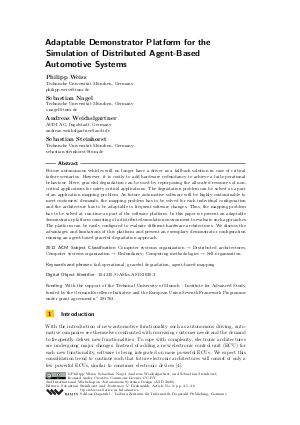Adaptable Demonstrator Platform for the Simulation of Distributed Agent-Based Automotive Systems
Authors Philipp Weiss, Sebastian Nagel, Andreas Weichslgartner, Sebastian Steinhorst
-
Part of:
Volume:
2nd International Workshop on Autonomous Systems Design (ASD 2020)
Part of: Series: Open Access Series in Informatics (OASIcs)
Part of: Conference: Workshop on Autonomous Systems Design (ASD) - License:
 Creative Commons Attribution 3.0 Unported license
Creative Commons Attribution 3.0 Unported license
- Publication Date: 2020-08-10
File

PDF
OASIcs.ASD.2020.3.pdf
- Filesize: 1.16 MB
- 6 pages
Document Identifiers
Subject Classification
ACM Subject Classification
- Computer systems organization → Distributed architectures
- Computer systems organization → Redundancy
- Computing methodologies → Self-organization
Keywords
- fail-operational
- graceful degradation
- agent-based mapping
Metrics
- Access Statistics
-
Total Accesses (updated on a weekly basis)
0Document
0Metadata
Abstract
Future autonomous vehicles will no longer have a driver as a fallback solution in case of critical failure scenarios. However, it is costly to add hardware redundancy to achieve a fail-operational behaviour. Here, graceful degradation can be used by repurposing the allocated resources of non-critical applications for safety-critical applications. The degradation problem can be solved as a part of an application mapping problem. As future automotive software will be highly customizable to meet customers' demands, the mapping problem has to be solved for each individual configuration and the architecture has to be adaptable to frequent software changes. Thus, the mapping problem has to be solved at run-time as part of the software platform. In this paper we present an adaptable demonstrator platform consisting of a distributed simulation environment to evaluate such approaches. The platform can be easily configured to evaluate different hardware architectures. We discuss the advantages and limitations of this platform and present an exemplary demonstrator configuration running an agent-based graceful degradation approach.
Cite As Get BibTex
Philipp Weiss, Sebastian Nagel, Andreas Weichslgartner, and Sebastian Steinhorst. Adaptable Demonstrator Platform for the Simulation of Distributed Agent-Based Automotive Systems. In 2nd International Workshop on Autonomous Systems Design (ASD 2020). Open Access Series in Informatics (OASIcs), Volume 79, pp. 3:1-3:6, Schloss Dagstuhl – Leibniz-Zentrum für Informatik (2020)
https://doi.org/10.4230/OASIcs.ASD.2020.3
BibTex
@InProceedings{weiss_et_al:OASIcs.ASD.2020.3,
author = {Weiss, Philipp and Nagel, Sebastian and Weichslgartner, Andreas and Steinhorst, Sebastian},
title = {{Adaptable Demonstrator Platform for the Simulation of Distributed Agent-Based Automotive Systems}},
booktitle = {2nd International Workshop on Autonomous Systems Design (ASD 2020)},
pages = {3:1--3:6},
series = {Open Access Series in Informatics (OASIcs)},
ISBN = {978-3-95977-141-2},
ISSN = {2190-6807},
year = {2020},
volume = {79},
editor = {Steinhorst, Sebastian and Deshmukh, Jyotirmoy V.},
publisher = {Schloss Dagstuhl -- Leibniz-Zentrum f{\"u}r Informatik},
address = {Dagstuhl, Germany},
URL = {https://drops.dagstuhl.de/entities/document/10.4230/OASIcs.ASD.2020.3},
URN = {urn:nbn:de:0030-drops-125974},
doi = {10.4230/OASIcs.ASD.2020.3},
annote = {Keywords: fail-operational, graceful degradation, agent-based mapping}
}
Author Details
Funding
With the support of the Technical University of Munich - Institute for Advanced Study, funded by the German Excellence Initiative and the European Union Seventh Framework Programme under grant agreement n^{∘} 291763.
References
- AUTOSAR. SOME/IP Protocol Specification R19-11. URL: https://www.autosar.org/fileadmin/user_upload/standards/foundation/19-11/AUTOSAR_PRS_SOMEIPProtocol.pdf.
- Ontje Lünsdorf and Stefan Scherfke. SimPy Discrete Event Simulation Library for Python, Version 3.0.9. URL: https://simpy.readthedocs.io.
- Felix Reimann, Martin Lukasiewycz, Michael Glaß, and Fedor Smirnov. OpenDSE – Open Design Space Exploration Framework, 2019. URL: http://opendse.sourceforge.net/.
-
Selma Saidi, Sebastian Steinhorst, Arne Hamann, Dirk Ziegenbein, and Marko Wolf. Future automotive systems design: Research challenges and opportunities: Special session. In Proceedings of the International Conference on Hardware/Software Codesign and System Synthesis (CODES+ISSS), 2018.

-
Philipp Weiss, Andreas Weichslgartner, Felix Reimann, and Sebastian Steinhorst. Fail-operational automotive software design using agent-based graceful degradation. In Proceedings of the Conference on Design, Automation and Test in Europe (DATE), 2020.

